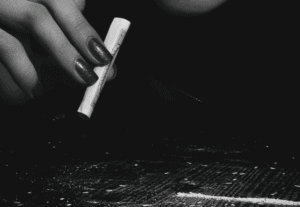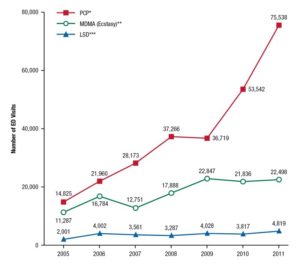History of PCP
PCP, clinically known as Phencyclidine or “Angel Dust”, was first synthesized in 1926 by pharmaceutical company Parke-Davis. By the early 1950s, the drug was introduced into U.S. medicine as an effective anesthetic and veterinary tranquilizer. For over a decade, PCP was a preferred anesthetic because of its ability to sustain normal blood pressure and airflow during patient procedures. Detrimental side effects of the drug eventually became evident, such as disorientation, delirium, and hallucinations; therefore, in 1965, PCP was limited to veterinary use only. Recreational use surged by the late 1960s and latest through the 1970s, leading to its official U.S. ban in 1978. By the 1980s, the use of PCP dwindled which, some argue, is a direct result of the widespread availability of crack cocaine, eventually becoming known as the crack epidemic. Although PCP is not as commonly used as it was in the 1960s-1970s, it still has a significant presence in the United States today. According to the National Survey on Drug Use and Health, a 2011 survey reported that 6.1 million individuals in the United States, ages 12 and above, reported using PCP at least once in their lifetime.

The PCP High
PCP can be taken orally, snorted, smoked, and injected (rare). It typically takes effect within 30-45 minutes of consumption and lasts from 3-6 hours. PCP produces a high in which the user experiences:
Hallucinations
Feelings of detachment
Rapid heart rate
Slurred speech
Sight and sound distortion
Feeling of invincibility
Violence
Side Effects of PCP Abuse
Long-term PCP abuse can cause lasting effects and irreversible damage. Such side effects include:
Paranoia
Seizures
Chronic anxiety
Suicidal ideation
Amnesia
Speech impairment
Coma
PCP Use in the United States
According to the National Center for Biotechnology Information, the estimated number of PCP-related emergency room visits increased more than 400 percent between 2005 and 2011 (from 14,825 to 75,538 visits); more recently, the number of these visits doubled between 2009 and 2011 (from 36,719 to 75,538)
PCP Addiction Treatment
PCP is highly addictive and life-threatening when abused; therefore, it is extremely important to seek help immediately if you or a loved one is struggling with the “angel dust” drug. At Asheville Recovery Center, treatment specialists utilize a 12-step program and practice holistic rehabilitation.
Services at the center include:
Partial Hospitalization Program – At Asheville Recovery Center we offer a partial hospitalization program for clients who need post-residential treatment as well as for clients who need primary treatment but are unable to enroll in inpatient programs. Our PHP track offers a variety of therapeutic services and benefits to individuals in early recovery from substance addiction. Our day program is full-time, offering all of the clinical hours provided in residential treatment (from 9 am to 5 pm) with the benefit of allowing clients to return home to a structured sober living environment at night. This gives individuals the opportunity to build a community of peers and practice life skills, such as cooking, cleaning, and self-care, while still participating in immersive and intensive clinical addiction and trauma treatment.
Outpatient Rehabilitation – During intensive outpatient treatment, clients live at home or in a sober living residence which can help keep them accountable for their recovery commitment. Our staff coordinates with local, reputable sober living homes to ensure that our clients are living in a safe place and that their needs are being met, even when they are not at clinical sessions. During this time, clients are also encouraged to become involved in local twelve-step fellowships, to find sponsors, and to begin working the steps of recovery through participation in these groups. IOP is a place where clients can process their experiences in twelve-step fellowships and support one another in those individual journeys.
Addiction is difficult to overcome alone. If you feel that you or a loved one is struggling with PCP abuse, our specialists are on standby and ready to help. Call (828)383-0784 and speak with an addiction expert today.







